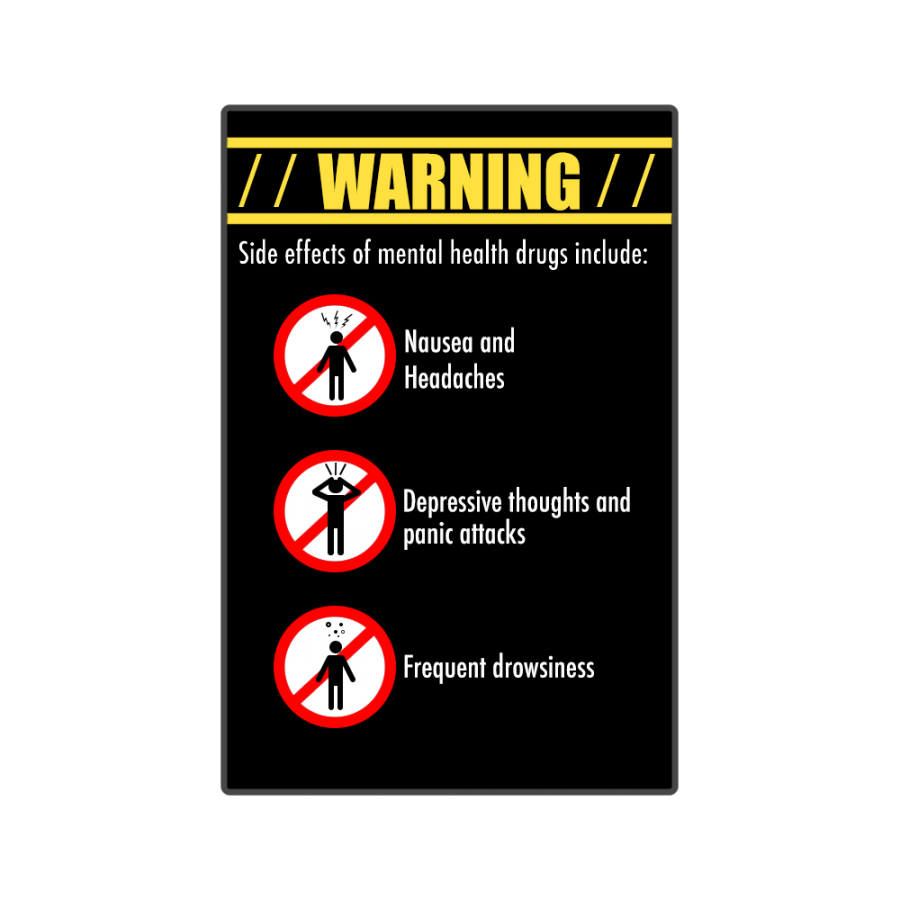In 2016, the National Center for Health Statistics found that almost one-half of Americans over the age of 12 take prescription medications. In recent years, there has been a major shift in the number of teens using these drugs, especially those prescribed to treat anxiety and depression. Within the large population of people who are taking these medicines, only 49 percent of patients are aware of the side effects that could come because of them—side effects that could potentially be harmful and affect everyday life.
Recent years have seen a large increase in students with depression and anxiety, which in turn leads to an increase in the diagnosis of medication. According to a study done by the National Institute of Mental Health, about 30 percent of girls and 20 percent of boys were reported to have an anxiety disorder. More than two million people age 12-17 reported having depression that affected them so much it impaired their everyday life.
As more people are being diagnosed with anxiety and depression, more medications are being prescribed. Medications for attention deficit disorders, such as ADHD, are also common. Although deficit disorders are not caused by the same factors as depression and anxiety, the three are combated with drugs that are very similar to each other and can have similar negative side effects. A student could be taking medication that increases their attention span, but could make them have panic attacks that could affect their work in class. Someone could start to take depression medication, but end up so tired that they almost sleep through the day. Likewise, taking medication to decrease anxious thoughts could still cause restlessness to an extreme.
Prescription drugs are very complex. Once ingested, they act as neurotransmitters, chemicals that transfer information in the body, basically rewiring and changing the chemistry of the brain. Each drug mimics a specific neurotransmitter, some with more drastic effects than others.
Medication isn’t bad, and for many people it delivers positive results without any complications. For others, however, unknown side effects can occur, such as nausea, headaches, suicidal thoughts and memory problems. Although severe side effects are not very common, it is important to know the possible changes that a drug can do to the body, especially for teens and kids, whose bodies and brains are developing.
“I think kids are trusting their doctor and parents, so they may not be examining side effects closely unless there is a specific concern that their doctor goes over in depth with them,” AP Psychology teacher Donna Walker said. “I also think that for most people who are in such a state of discomfort the concern is to fix that outstanding issue, so the concern of side effects is really secondary to your original medical condition.”
By acting as a messenger, mental health medications are able to communicate with the brain and balance chemicals. In the brain, there are many chemicals that affect happiness, focus and overall mental health, including dopamine, serotonin, oxytocin and endorphins. These four chemicals are vital for a healthy brain and body. Having one or more of these chemicals imbalanced in the brain can lead to sadness, withdrawal from social activities and stress.
Depression is greatly affected by the amount of serotonin in the brain. That is why drugs like selective serotonin reuptake inhibitors, also known as SSRIs, are effective. SSRIs prohibit serotonin to be reabsorbed in the brain, allowing more to be used, which helps improve mood. These medications can greatly improve the condition of patients with depression, but the effects only last while someone is taking the drug, and go away when the medication is stopped. It is not uncommon for someone taking antidepressants to stop taking them because they feel better and think that they no longer need them.
Benzodiazepines are another common drug; they are used to treat anxiety and panic attacks. Instead of blocking the brain from absorbing chemicals, they transmit messages that allow the brain to send messages to the body quicker than they had been previously traveling. Attention deficit disorders are commonly treated with stimulant drugs, such as amphetamines, that can increase brain activity and lower blood pressure.
For most of the population, drugs like SSRIs, benzodiazepines, and amphetamines are very helpful for treating mental health disorders. When the medications do not work, however, they can be destructive and harmful.
It is not uncommon for SSRIs to cause nausea, insomnia and blurred vision. Because SSRIs affect the amount of serotonin, a chemical that affects emotion and attitude in the brain, they are able to make a large impact on overall health. They can also cause stomach problems and restlessness.
Some mental health medications may solve one problem but cause another. While benzodiazepines can decrease the symptoms of anxiety, they can also lead to a feeling of depression, confusion, or aggression, all of which can cause someone to stop interacting with other people. Stimulant drugs can cause anxious thoughts and even give someone panic attacks.
Even over the counter medications have possible side effects. Stomach problems can come from almost every drug on the market. The side effects are not just on the inside of the body, medications can cause skin irritation as well.
It isn’t that side effects are hard to find, with so many resources available to start research and actually discover the unknown facts about medication. Often, it is the choices of large drug companies to gloss over the risks and dangers of taking medication. Almost every television channel has ads for medications, showing a subject who automatically transitions from struggling with health problems to living an easy, happier life. Side effects are usually written in as text at the bottom of the screen, or someone talks about them so fast that they are almost unable to be understood.
Although there are so many health-threatening side effects, not all of them are so severe. Having such dangerous side effects is very rare, but it is still possible. There are many more common side effects that are associated with prescription medication, such as weight gain, nausea and headaches. Headaches and other pain can be treated with over-the-counter pain drugs like Tylenol, as long as it is safe to take with the prescribed medicine.
“I think side effects are important, but even more important I think are discussing options outside of medication,” Walker said. “I am not anti-psychotropics, but I also am not convinced enough practitioners are insisting that other treatment routes be explored first.”
There are several treatments other than medication for anxiety and depression. Psychotherapy is often helpful for people with mental illness. Talking to a therapist about once a week can help people overcome the negative effects of mental illness. Psychotherapy is one of the most successful methods of treatment other than meducations. Many patients who use therapy to treat mental health disorder can become completely cured through repeated sessions. For some, its even more successful than medication because it provides help and long-term benefits without the risk of medications, including side effects and withdrawal symptoms. It is also important to exercise. Not only does exercise improve physical health, but it also combats many symptoms of anxiety and depression, according to the Anxiety and Depression Society of America. Physical activity leads to the release of endorphins in the brain. Endorphins are neural chemicals that act as “natural painkillers” that help decrease stress, symptoms of anxiety and depression, and aid in a better night’s sleep. Getting enough sleep impacts mental health as well. Not only does too much sleep deprivaion lead to a lack of focus and drowsiness, it can also lead to worsened feelings of anxiety or depression.
Raising awareness about the side effects of medications is important for everyone, not just the population using the drugs. If a loved one or friend is taking a medication and it isn’t working, knowing the signs could help them and even save them. Antidepressants can cause suicidal thoughts and even worse depression if they are not working. There are anxiety medications that can cause restlessness and seizures. Even prescribed pain relievers can be detrimental to someone’s health.
Know what to look for when you or someone you know are prescribed to a specific medications. Side effects, while not always prominent, can range from a minor pain or drowsiness to a life threatening condition. With these medications becoming more and more common, more people are being treated, but there is a larger amount of people at risk as well.











